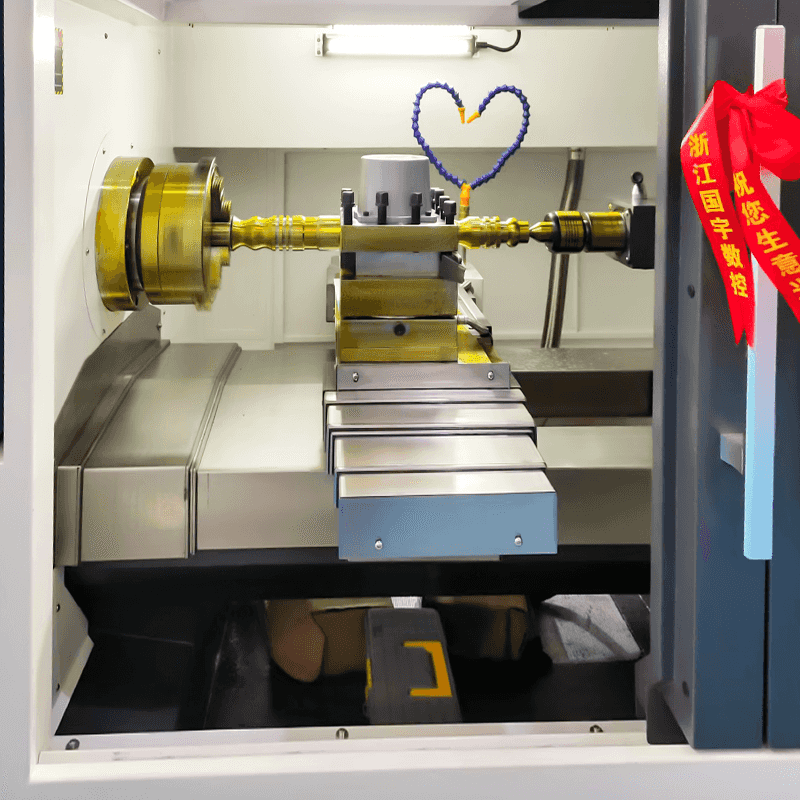Technical Characteristics: Integral fully enclosed protection, strong and sturdy, stable operation, ...
See DetailsHard rails are often preferred in applications demanding exceptional rigidity and durability, such as heavy milling, grinding, and other machining processes involving substantial cutting forces.

Advantages of Hard Rail CNC Machines
1. Durability and Longevity
Hard rails are made from hardened steel, providing wear resistance over prolonged use. Their sturdy construction allows them to withstand heavy loads and harsh machining conditions, contributing to a longer service life compared to softer or ball-bearing based guide systems.
2. High Rigidity
Due to their solid and robust design, hard rail systems exhibit minimal deformation under heavy loads. This rigidity translates into improved machining accuracy and surface finish, particularly important for large workpieces or materials requiring high cutting forces.
3. Cost-Effectiveness in the Long Run
While the initial investment in hard rail CNC machines may be comparable or slightly higher than other types, their reduced maintenance frequency and extended lifespan often result in lower total cost of ownership. The simpler construction compared to linear guides also facilitates easier repairs.
Key Factors to Consider When Choosing a Hard Rail CNC Machine
1. Application Requirements
The foremost consideration is the intended application. Hard rail CNC machines are better suited for operations involving:
Heavy cutting or grinding with large or dense workpieces.
Machining of metals such as steel, cast iron, and titanium.
Processes where vibration damping and rigidity directly affect part quality.
If your work primarily involves light or medium machining, or materials with low hardness, other CNC types with linear guides might offer better speed and smoother motion.
2. Machine Size and Travel Range
Assess the size of the workpieces and the necessary travel range for each axis. Hard rail machines can accommodate large work envelopes, but their size and weight increase significantly with travel length. Choosing a machine with appropriate dimensions that fit the workshop space and handling equipment is critical.
3. Precision and Repeatability
While hard rails inherently offer high rigidity, precision also depends on factors like rail quality, bearing type, and the machine's overall build. Look for machines with:
Hardened and ground rails with certified surface flatness.
Matched bearing blocks or roller slides designed to minimize backlash.
Calibration capabilities and compensation systems to maintain accuracy over time.
Understanding the achievable tolerance levels and repeatability is essential to ensure the machine meets your product specifications.
4. Maintenance and Support
Hard rail systems generally require less frequent maintenance compared to linear guideways, but they still need proper lubrication and periodic inspection. Evaluate the availability of technical support, spare parts, and the ease of performing maintenance tasks.
Choosing a manufacturer or supplier with a strong service network can minimize downtime and ensure long-term productivity.
5. Control System and Software Compatibility
The CNC controller and software integration significantly impact operational efficiency. Ensure that the machine's control system supports the required programming languages, automation options, and connectivity with CAD/CAM systems.
Modern CNC controllers often include advanced features like real-time monitoring, error compensation, and multi-axis synchronization, which enhance the performance of hard rail machines.
6. Budget and Return on Investment
While hard rail machines may entail a higher upfront cost due to their robust design, the durability and precision often justify the investment. Conduct a thorough cost-benefit analysis that considers factors such as:
Expected production volume and cycle times.
Quality requirements and scrap reduction.
Maintenance costs and machine downtime.
Balancing budget constraints with technical requirements will guide you toward the economically viable choice.
Additional Considerations
Environmental Conditions: Hard rails perform well in dusty or abrasive environments since their construction is less sensitive to contamination. However, proper sealing and dust management remain important.
Our team of digital and business experts will guide you to the right direction.
Let's Talk